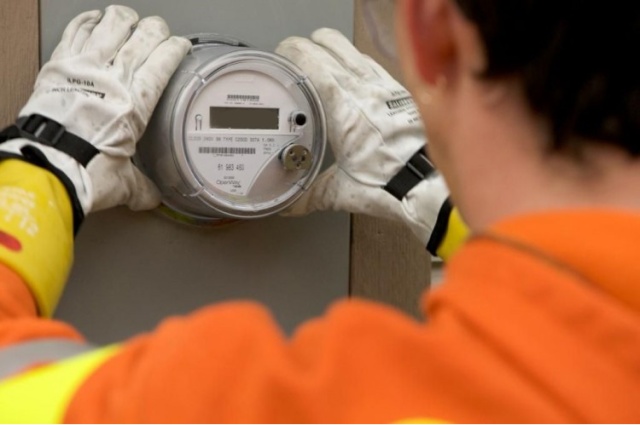 Today, Illinois’ biggest electric utility will begin installing digital “smart meters” in Chicago’s western suburbs, launching an ambitious plan to give 4 million customers new meters by 2021.
Today, Illinois’ biggest electric utility will begin installing digital “smart meters” in Chicago’s western suburbs, launching an ambitious plan to give 4 million customers new meters by 2021.
These new meters, built in a plant on the city’s South side, are a symbol of high-tech upgrades, collectively called the “smart grid,” that have the potential to make our electricity more reliable, cleaner and more affordable. But there’s a lot of work to be done.
The Chicago Tribune reports that ComEd will alert customers by letter, automated phone calls, and a knock on the door before installing a new meter. The actual installation will take about 10 minutes, and will probably include a brief power outage, the Tribune reports. ComEd also will hang a sign on the door to let people know of the new meter.
Your meter will have a new look—the confusing mechanical dials of the old analog meters will be gone, replaced by a digital face. And it won’t have to be read each month—the new devices can almost instantly transmit information about your home’s total electricity usage to the electric utility. (Note: The meters don’t transmit personal identification information about customers, and they can’t identify specific electricity usage, or what appliances you’re using at the moment. Read more about the digital meters.)
The digital meters set the stage for cutting-edge improvements, like new pricing programs and appliances that can be powered down via your smartphone. But the beauty of a “smart grid” done right is that it can improve the lives of all customers—even those who change little about the way they use electricity. CUB’s “smart grid” fact sheet shows how building a better grid can prevent costly, widespread power outages and all but eliminate a major complaint from Illinois consumers: estimated bills. Plus, a modernized grid could help reduce billions of dollars in operating inefficiencies that we ultimately pay for on our power bills.
But this all remains to be seen. It’s been nearly two years since ComEd and Ameren won the right to charge us higher bills to pay for building a better grid. The fact that meters are being installed is one step forward in a long journey.
The biggest challenge of all may be holding utilities to their promise of building a smart grid that benefits consumers. It’s a major paradigm shift for companies that for years encouraged customers to use more power. Now they are building a power grid that should help consumers become more efficient and use less.

